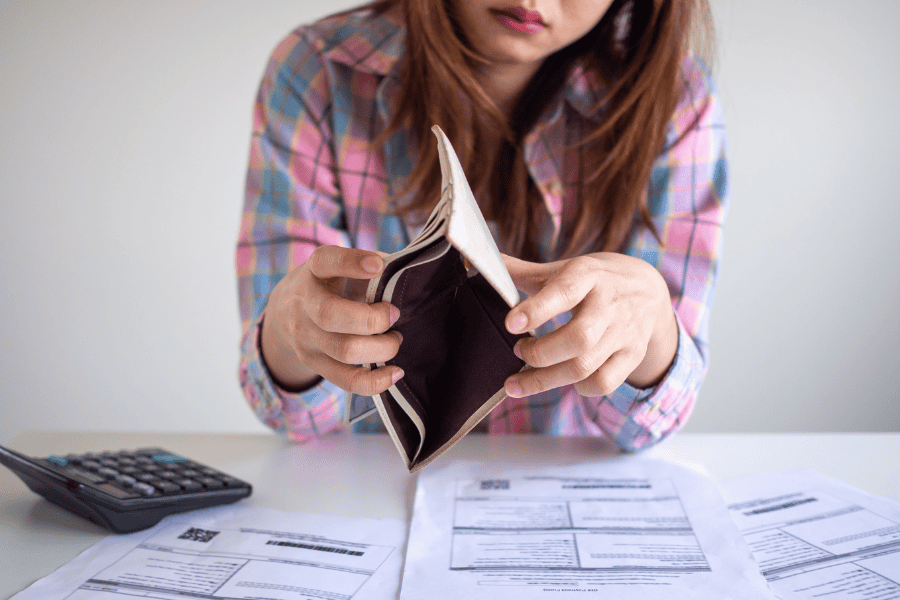Last Updated September 22, 2024 by Davina Kelly
Managing your finances can feel overwhelming, especially when you’re just starting out. But breaking bad money habits is one of the most powerful ways to gain control of your money.
Learning how to handle your finances can set you up for a lifetime of financial independence.
In this post, we’ll go through some bad money habits and how to fix them. By making small changes, you’ll see big results, just like I did.
Once I changed my money habits I was able to save over $50,000, pay off debt, and grow my money through investing. And I am not special so If I can do it, you can too!
This post may contain affiliate links, which means we will receive a commission if you purchase through our links, at no extra cost to you. Please read full disclosure for more information.
11 Bad Money Habits You Need To Break:
1. Paying Yourself Last
One of the most common money traps people fall into is paying themselves last. It’s easy to spend on bills, rent, social plans and then save whatever’s left over. But more often than not, there’s nothing left. This habit can leave you stuck, never saving enough to build real financial security.
To break this bad money habit, pay yourself first. As soon as you get paid, move at least 10% into a savings account. Treat it like any other bill you have to pay.
This is how I was able to save over $50,000.
Once you’ve established this routine, you’ll slowly but surely grow your savings and give yourself more freedom and security.
2. Getting Comfortable with Debt
Debt has become normalised in today’s society. Many people use credit cards to finance everyday purchases like gifts, clothes or dinners out. But relying on credit to pay for things you can’t afford can quickly get out of control.
With the current average credit card interest rate of 24.9%, it makes it hard to get ahead. And debt can easily hold you back from reaching your financial goals.
To avoid this, don’t use debt for things you can’t afford. If you can’t pay for something with cash, don’t buy it. This might sound harsh, but it will save you from accumulating bad debt down the line.
If you do use a credit card, make sure you have the cash on hand and always pay your balance in full every month.
Building a savings buffer by paying yourself first will reduce the need to rely on credit cards in the first place.
3. Having No Emergency Savings
Many people live paycheck to paycheck which makes it nearly impossible to handle unexpected expenses without using credit. This is why having a financial buffer – an emergency fund is essential.
An emergency fund provides the cushion needed to handle small emergencies like car repairs, medical bills or job loss without going into debt.
To create this buffer, prioritise paying yourself first, as mentioned earlier. Aim to save at least three to six months of living expenses. If that seems overwhelming, start small – even $500 or $1,000 is a great start.
Over time you’ll gradually build your emergency fund and be ready for whatever life throws your way. With savings in place, you won’t have to rely on credit when things go wrong.
4. Not Budgeting
Budgeting is often seen as restrictive, but it’s actually one of the most empowering money habits you can adopt. Without a budget, it’s easy to overspend, especially when your income grows.
You can’t manage what you don’t measure and this is where many people fall into the trap of lifestyle inflation.
Lifestyle inflation happens when you increase your spending in proportion to your earnings. This habit can leave you with little to no savings, even though you’re earning more and may eventually lead to debt.
To avoid this bad money habit, create a simple budget that works for your lifestyle and goals. A good budget helps you track your income and expenses, identify where your money is going and uncover opportunities to cut back.
It also ensures you’re saving and investing consistently, rather than spending aimlessly.
Budgeting encourages mindful spending, which helps you stay aligned with your financial goals and avoid financial stress.
Personally, budgeting has been a game-changer for me. It allowed me to pay off debt and showed me exactly where I could save more and invest.
The great thing about budgeting is that it puts you in control of your finances, rather than wondering where your money went at the end of the month.
You can use tools like budgeting apps, spreadsheets or printables to simplify the process.
If you’re new to budgeting and unsure where to begin, I’ve got you covered. This step-by-step guide will help you create a budget that works.
Plus, don’t forget to grab your FREE printable budget tracker below to help you get started.
5. Living Above Your Means
It’s tempting to spend more as your income increases, but that’s how lifestyle inflation sneaks in. Living above your means is one of the most common bad money habits, and can seriously hinder your ability to save, invest and build wealth.
The key to avoiding this trap is to stay disciplined with your spending. One of the best ways to do this is by sticking to a budget that prioritises growing your money.
When you get a raise or extra income, resist the pressure to upgrade your lifestyle.
Instead, put that extra income into savings and investments. The truth is, wealth isn’t built by spending – it’s built by saving and growing your money through investments. By focusing on financial growth instead of lifestyle upgrades, you’ll set yourself up for long-term success.
6. Overspending
Overspending can happen quickly, especially with the convenience of online shopping. One minute you’re buying new skincare, and the next you’ve added makeup, shoes, and a new bag to your cart.
These unplanned purchases add up, leaving your bank account drained and little to show for it.
To break the overspending habit, start by tracking your expenses. This will give you a clear picture of where your money is going and highlight areas where you can cut back.
For example, if you notice that you’re spending $300 a month on clothes, you can make a conscious effort to reduce your shopping and redirect that money toward savings.
Automating your savings is another great strategy that worked for me – it ensures you save first, which reduces the temptation to overspend.
Try setting spending limits for different categories like eating out or shopping to help you stay within budget. This will free up more money to put towards your financial goals.
You can allocate a specific amount or a percentage of your income for these “fun” expenses and use a separate card to track it. That way, you can enjoy the things you love without straying from your budget.
When I started spending less, I had more money to save and invest, which made a huge difference in improving my finances.
Related: How To Stop Spending Money 12 Best Tips To Avoid Overspending

7. Saving To Build Wealth
Saving is a fundamental part of managing your finances, I can’t stress that enough, but it’s not enough to build wealth over time.
Saving does help you build a financial safety net but it has its limits. You can only save so much, but there’s no cap on how much you can earn or invest.
To truly build wealth, you should focus on both saving and growing your income. Think beyond cutting expenses and consider ways to generate more money.
Diversifying your income streams is a powerful way to unlock financial freedom. Whether it’s through investing in the stock market, negotiating a pay raise, or starting a side hustle, increasing your income allows you to build wealth faster.
For example, you could invest in assets like stocks or real estate, which allow your money to grow through compound interest. The more you diversify, the more opportunities you create for your money to work for you.
Building wealth is about creating multiple streams of income, not just relying on savings alone.
Here’s the bottom line: Save smart, but also focus on growing your income through various opportunities.
8. Participating in Expensive Hobbies
Hobbies and leisure activities are essential for a balanced life, but many people get trapped in expensive hobbies that can drain their finances. Whether it’s frequent shopping, eating at fancy restaurants or pricey recreational activities, these luxuries can add up fast.
Improving your finances is about finding a balance between enjoying life and being financially responsible. That doesn’t mean you have to stop doing the things you enjoy – I believe you should enjoy the fruits of your labour.
However, consider more affordable alternatives for entertainment or even find ways to monetise your hobby. For example, if you love art, start offering commissions or sell your prints online. This way you can make money while doing what you love.
9. Waiting Too Long To Invest
One common mistake I see people make is waiting too long to start investing. Many people put it off because they think they don’t have enough money or knowledge to get started.
But delaying your investments can actually set you back on your financial journey. The longer you wait, the more you miss out on the power of compound interest, which is one of the most effective tools for building wealth.
As soon as you have your emergency fund in place it’s time to start investing and make your money work for you. You don’t need to be an expert or have a ton of cash to get started.
Consistency is key. Even small, regular contributions to an investment account will add up and grow over time. I started small with little knowledge and now I have grown a five-figure investment portfolio.
If you’re nervous about risk you can begin with low-risk options like index funds or ETFs which offer diversification and steady growth. As you grow more comfortable with investing, you can explore additional strategies.
Don’t let fear or lack of knowledge hold you back. Remember, the earlier you start, the easier it is to reach your long-term financial goals.
If you’re a beginner looking for some guidance on how to get started, check out my posts below.
Related posts:
The Ultimate Investing Guide for Beginners
How To Invest In Index Funds: A Complete Beginners Guide
10. Leaving Too Much Money in The Bank
Leaving your money in the bank feels safe, but it’s not doing much for you there. Over time, inflation reduces the value of your money. This means what you can buy today with $100 might cost a lot more in a few years.
The low interest rates of most savings accounts can’t keep up with inflations, which causes your money to lose its purchasing power.
Once you’ve built your emergency fund, move your extra savings into investments. Personally, I use a combination of high-interest savings accounts and investment accounts to keep my money working for me.
The goal isn’t to drain your checking account completely but to be strategic. Keep enough cash for emergencies and immediate expenses, but don’t let the rest sit idle in a regular bank account. Instead, invest in assets that grow over time and outpace inflation.
Your money should be growing, not sitting still. So, move your extra savings into assets that work for you.
11. Not Having Money Goals
Without clear money goals, it’s easy to lose focus and drift through your financial life without making progress. Setting specific, measurable financial goals gives you a sense of direction and keeps you motivated.
Whether you’re aiming to save for a down payment on a house, pay off student loans or retire early, having goals helps you prioritise your spending and saving habits.
Start by setting short-term and long-term financial goals. Short-term goals might include paying off a credit card within six months or saving $10,000 in a year for a new car.
Long-term goals could be building a retirement nest egg or saving for your child’s education. The more specific and measurable your goals, the easier they are to achieve.
I found that setting goals made all the difference in my financial journey. I set targets to pay off debt and save for a home and each goal gave me the motivation to stick to my budget and keep moving forward.
Goals give you something to work toward and make it easier to stay disciplined and focused on your financial journey.
Final Thoughts: Breaking Free from Bad Money Habits
We all have bad money habits, but the good news is they can be changed. Paying yourself first, living within your means and setting goals are just a few ways to improve your financial situation.
I was able to save $50,000, pay off debt and start investing by making these small powerful changes.
By breaking free from these habits, you’ll gain control of your money and set yourself up for financial success.
What are some of your bad money habits? Let me know in the comments below.
This post was all about bad money habits.
Other Posts You May Like:
How To Live Below Your Means 13 Tips To Save You Money
The Ultimate Guide To Investing for Beginners
How To Create a Budget From Scratch

Davina Kelly
Hey! I'm Davina, the owner of Davinas Finance Corner. I'm passionate about finding ways to budget, save, earn more money and improve your life. After breaking free from payday loan debt and living paycheck to paycheck I want to share my experience to help other women improve their finances.
